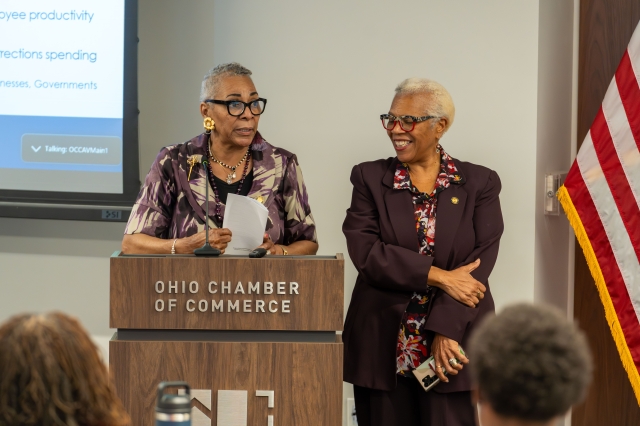Inaugural Black Maternal Health Summit Calls for Statewide, Bipartisan Action During Minority Health Month

On Tuesday, April 15, state Senators Catherine Ingram (D-Cincinnati) and Paula Hicks-Hudson (D-Toledo) hosted the Inaugural Black Maternal Health Summit at the Ohio Chamber of Commerce. Held in recognition of Minority Health Month and Black Maternal Health Week (April 11–17), the summit brought together policymakers, healthcare providers, researchers, and advocates to address Ohio’s maternal and infant health crisis—particularly its devastating impact on Black families.
The summit emphasized that improving maternal and infant health is a public health priority that affects all Ohioans regardless of race, geography, or political affiliation. Healthy mothers and babies are the foundation of strong communities, and the disparities in outcomes demand urgent, collective, and bipartisan solutions.
Shayla L. Davis, President of the Ohio Legislative Black Caucus Foundation, served as Master of Ceremonies for the full-day program, which featured a series of powerful discussions and data-driven insights.
The event opened with a legislative panel featuring state Representatives Sedrick Denson (D-Cincinnati), Meredith Lawson-Rowe (D-Reynoldsburg), and Adam Holmes (R-Nashport), who highlighted current and proposed legislation aimed at tackling maternal health disparities. The panel reflected a shared, bipartisan understanding that Ohio cannot afford to ignore the rising maternal mortality rate and stark racial inequities.
Authors Jill Miller and Dr. Meredith Smith presented on their book, Infant Mortality and Other Wicked Problems, drawing from their work with Cradle Cincinnati—a nationally recognized model that has significantly reduced infant and maternal mortality in the region through community-rooted, data-informed strategies. Their insights provided a compelling case for replicating these successful interventions statewide.
Former state Senator Charleta Tavares, a longtime public servant and health equity advocate, delivered the keynote address, tracing the progress Ohio has made and the systemic changes still needed to eliminate preventable maternal deaths and close racial gaps in infant survival.
Moderated by Angela Dawson, Director of the Ohio Commission on Minority Health, the provider panel featured leading voices in maternal health from across the state:
- Dr. Meredith Shockley-Smith, Executive Director, Cradle Cincinnati & Founder of Queens Village
- Dr. Kami Dixon, Medical Director, Moms2B (Columbus)
- Dr. Stacey Scott, Executive Director, Baby1st Network (Toledo)
- Dàna M. Langford, CNM, CEO & Medical Director, Village of Healing (Cleveland)
These experts shared the realities their communities face, as well as recommendations for what policymakers and healthcare systems must do to improve access, quality, and culturally responsive care.
Despite progress in some areas, Ohio continues to rank among the worst states for Black maternal and infant health outcomes. Black women are nearly three times more likely to die from pregnancy-related causes than white women, and Black infants die at more than twice the rate of white infants in the state. These disparities are rooted in long-standing structural inequities—not differences in biology—and are preventable with intentional investment and policy change.
The Summit closed with a press conference at the Harding Senate Press Briefing Room, where attendees called for urgent, coordinated action.
The Inaugural Black Maternal Health Summit marks a critical first step in building a sustainable, bipartisan movement for maternal health equity in Ohio—one that puts the lives of mothers and infants at the center of state policy, public health, and community care.



